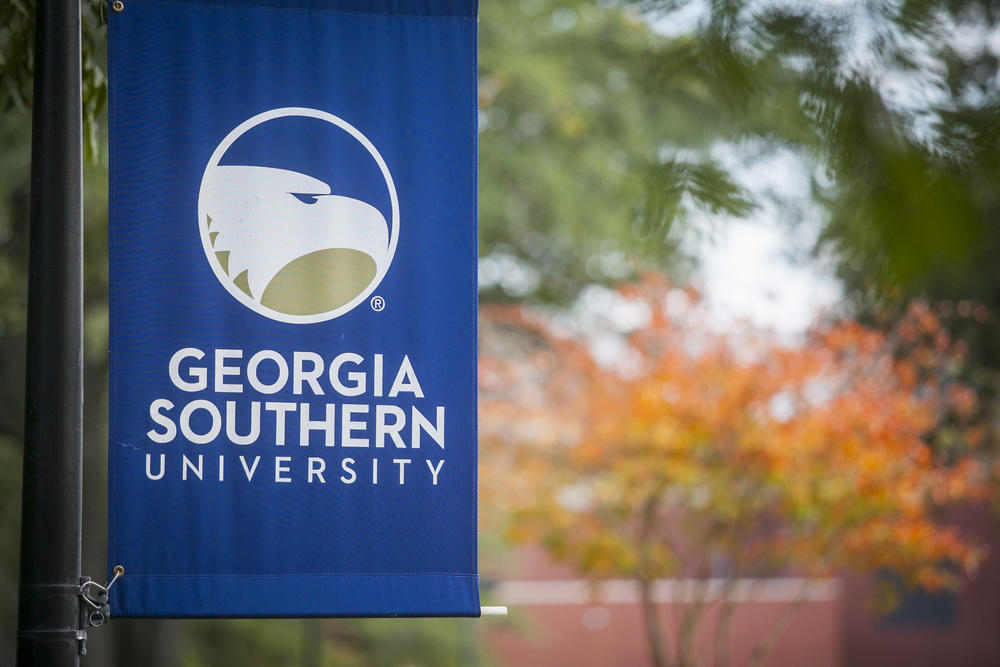Section Branding
Header Content
For Journalism Students, Campus Book Burning Is Real-Life Training
Primary Content
Students of Georgia Southern University gathered Wednesday night for a difficult conversation about race, free speech and tolerance.
It comes after a book burning on campus.
Author Jennine Capó Crucet gave a lecture last week on the university's Statesboro campus on her 2015 novel Make Your Home Among Stragers.
Students participating in the university's Freshman Year Experience program had been assigned the novel that focuses on the Cuban American immigrant experience.
During the event, there was a heated back-and-forth between one student and Capó Crucet about white privilege. Later that night, a small group of students gathered outside a residence and burned their copies of her book in objection to her comments.
A video of the book burning was then widely shared on social media.
Georgia Southern's student newspaper, The George-Anne, broke the story of the book burning.
McClain Baxley is the editor-in-chief of that paper. He spoke to GPB's Rickey Bevington from Statesboro about controversy and what's next for the university.
This conversation has been edited for clarity and conciseness.
Rickey Bevington: This story has been picked up by national outlets. There have been school-wide meetings and a teach-in about the historical significance of book burning. What has been the atmosphere like on campus since this happened last Wednesday?
McClain Baxley: The atmosphere has been divided. There's been people on the side of the book burning saying that the First Amendment protects them.
There's also the other side where there's people that are up in arms [saying] that the administration hasn't done a lot to condemn or punish the students.
There's been a divide, both racially and also just First Amendment vs. book burning. There has [also] been kind of a divide both on phycially the campus and also online.
so after our FYE book’s author came to my school to talk about it... these people decide to burn her book because “it’s bad and that race is bad to talk about”. white people need to realize that they are the problem and that their privilege is toxic. author is a woman of color. pic.twitter.com/HiX4lGT7Ci— elaina⭐️ (@elainaaan) October 10, 2019
Bevington: It was only a few weeks ago that the university released a survey on students' opinions about diversity on campus. One of the major themes to come out was that students felt Georgia Southern isn't doing enough to encourage equity and inclusion.
What have you heard from people of color on campus about the book burning?
Baxley: There's more people of color and minorities that are against the book burning. [They feel] there's been no growth or no education from these students that have done this. That's how they are perceiving it.
And then more so from white students, there's more on the side of defending the book burners. That's where that racial divide has come into play.
Bevington: Georgia Southern University President Kyle Marrero spoke with students at an open forum last night. What does the administration say that they're going to be doing going forward?
Baxley: Kyle Marrero spoke on the Armstrong campus Monday and yesterday at the history department's lecture. He, along with the administration, is saying that there's no punishment for these students, but they will be continuing to educate and learn and grow from this incident and from this experience.
[That's] through classes, through more teach-ins, more lectures and open forums, and to have conversations about diversity, about inclusion, which were already in place after the report dropped out. I think with this incident, it just heightens the need for conversation about diversity.
RELATED: Georgia Southern Faculty, Students Address Book Burning
Bevington: You're a student journalist who has led the coverage of this story. What has it been like covering a major news event like this?
Baxley: My news editor, Sarah Smith, she's the one that brought [it] to my attention last Thursday morning. She shared with me the tweet and the video of the incident. Since then, we did an initial story, and there's been reaction. Since I started here three or four years ago, we always try to be as accurate and as concise as possible.
Now that we have that lens of the nation on us, it's even more important for us. We're just making sure that we use to our advantage the abilities we have as student journalists being in Statesboro, not in Washington and not in New York that other mediums can't use.
We have relationships with some students. We have relationships with student leaders, administration that we plan to and have used to our advantage.
It's been a learning on the job for sure, covering it and making sure we're staying unbiased, not taking sides on either side, from myself as editor-in-chief all the way down to my daily reporters.


